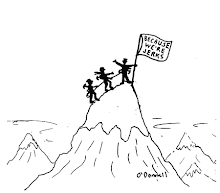In Chicago, birthplace of my master's degree and my seasonal affective extravaganza.
Today a few things happened that had something to do with something. One was that I ate at Harold's, which is not really worth talking about here but it's pretty much reason enough to love Chicago. Even if I sort of, ok, don't. Longer story.
One was that I had lunch with my old supervisor and talked about a thing about supervision we both find kind of interesting, to wit: the fact that it tends to have elements both of therapy and plain old administration, and nobody really talks about this balance much as it's happening.
I had two really me-centered internships in grad school. I wasn't asked to do tasks my supervisor wanted to get rid of. I was treated as someone who was there to learn, and whose training was a priority. I'm very grateful for this. One placement was at a residential HIV facility and the other at a community mental health center, famous at my school for being a great place to intern if you were really interested in psychodynamic therapy. (Yes, it's a long way from what I set out to do to my current tenure at the Lemonade Society, which I have just decided to call my current job. I suppose plenty of us don't do what we thought we were going to do.)
My supervision at the first place was a little like therapy, in that it was a regular hour a week where I could say whatever was on my mind, and was encouraged to. I think I was probably sort of overwhelming, because I had no idea about anything. I remember launching into some monolog about what I called "therapeutic affect" which was just my way of asking basically "should I try to talk like a shrink?" (Answer, courtesy of the next few years: no; you will simply end up doing it.)
Supervisor J had a terrifically helpful calm and certainty, which made for an excellent "holding environment" as they say in the biz. Some of it was just how he is. I know this now because we've been friends for years. Some of it was him seeing his role as, in part, that of the therapist. I feel certain this is true. The analytic therapist, I should say, as there was a lot of that kind of reflectiveness that, depending on how you feel about that kind of thing, gives you enough rope to hang yourself or teaches you negative capability in a really important way. Obviously I lean toward the latter view.
So then second year rolls around and I go to the community mental health center and am a therapist, hilariously. I don't think I was awful but I was certainly not a pro. I quickly learned that supervision can only do so much--in the actual therapy hour, you are in there on your own.
I'm not a kid person, by the way. I don't have an easy rapport with kids. It's something I accept and occasionally take a perverse pride in just because it's fun not to be on the same page as everyone once in a while. A woman in the seminar I had to take to supervise interns two years ago said something to me like "oh it's just all worth it when you get to work with the little ones, isn't it?" and I can't deny I kind of enjoyed saying "oh I try not to work with them, if at all possible."
So I really didn't want to work with kids, but the thing is good fucking luck with that if you're at a community mental health center. Supervisor S was pretty sensitive to my nervousness about it, but there was only so much she could do, and of course she rightly thought it would be important in a lot of ways to go ahead and work with them anyway. I ended up just having two all-year kid cases, and I think back on them fondly and wonder what the hell they're doing, but in the moment, a lot of it was terror. And it gets worse, because parents who put their kids in therapy are terrified too, and accordingly can be hard to deal with.
Wait, what was the point of this...
Well, S was pretty orthodox about some basic analytic stuff, sometimes in ways that drove me mad. Talking to her in supervision about kids in particular, I would say, oh, something like "what the hell do I do when she talks about cutting herself?" and S would tilt her head and say "huh...what comes to mind? what do you think?" And I get this technique, of course, but I also was not at a stage where I could use it. I knew nothing. I wanted some goddamn input.
Another thing she did that was really hard for me to deal with was the psycho-a tic of turning everything around. "[Client] seemed really angry with me," I would say, and again the head tilt, and "it sounds like someone was angry with someone, anyway." One time we sort of brought it into the room in a way neither of us knew what to do with. She told me it sounded like I had some hostility toward the parents of a child and I said "I'm wondering if you have some hostility toward them" and she seemed really thrown by this.
Suddenly I'm talking more about doubts I have about analytic stuff than supervision and whether it should be like a therapy hour, and I guess that's fine...
🦋 Cottleston Pie
2 months ago
